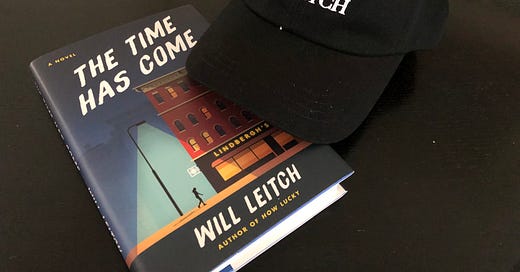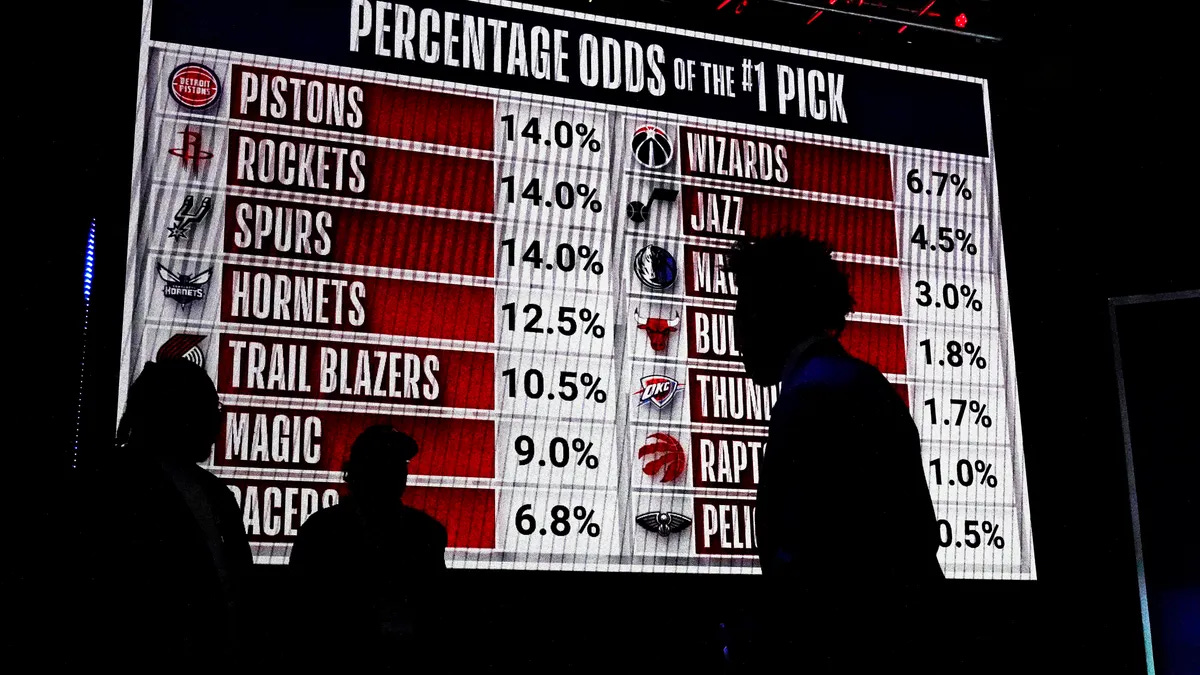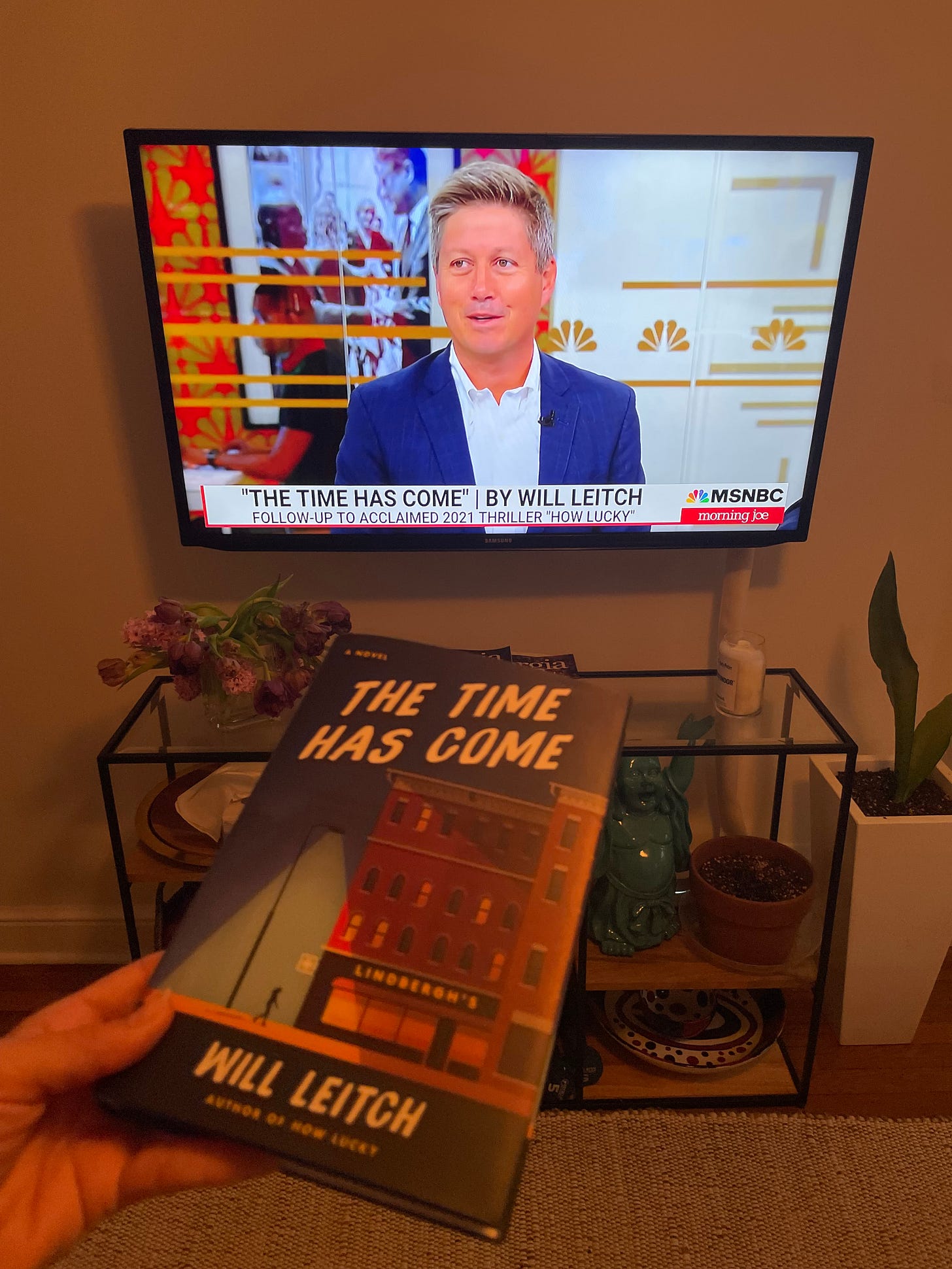Volume 4, Issue 69: John Tudor
"He has his own stubborn way of getting hitters out that's uniquely his."
Hey, the book’s out. If you haven’t bought it yet, you should. If you have, you should write a (hopefully positive!) review of it on Goodreads or Amazon or both. I hope those of you who have a copy are enjoying it.
As you can surely tell from reading this newsletter over the last three months, a period of time when I have desperately, cravenly, begged you, in every possible undignified fashion, to buy my new book (which is out this week, The Time Has Come, Publisher’s Weekly loves it, make sure to purchase it here, on and on he somehow keeps going), I am terrible at selling things. I truly, profoundly hate selling things. I do not know if I am terrible at selling things because I hate doing so, or if I hate selling things because I am so bad at it. I suppose it doesn’t really matter.
I have a profound respect for people who are skilled at sales, people who are legitimately talented at it—who even love it. I find the art of it almost mystical, as the salesperson were a mind reader, able to peek inside the soul of their potential customer and understand what they want, what they desire, perhaps better than the person understands themselves. One of the many, many reasons “Mad Men” was such a great show—and every year that goes by, I think more and more that that show got something dead-perfect about America—that it emphasized the artistry of the sale, how it could be done gracefully, with tenderness and genuine emotion, by the true geniuses of the field. (Even if it sometimes tore them apart inside.) My sister discovered, relatively late in her life, that she had a surprising ability to sell things—specifically, in her case, high-quality scissors to hair stylists. I can’t even fathom how a person would sell scissors, but I do believe if you can sell scissors, you can sell anything. My sister has the gift: She’s personable, she’s likable, she’s sincere. People believe that she believes she is selling great scissors, and therefore they buy them from her. It doesn’t need to have to be all that complicated.
But my brain just can’t get there. I find myself obsessed with one question that I suspect actual professional salespeople would find pointless, or at least irrelevant: But the scissors are amazing, right? One of the things I realized early on about myself was that if I didn’t care deeply about something I was doing, I was incapable of faking it in even the most half-hearted way. This has led to all sorts of problems: I nearly failed every class that wasn’t about something I was interested in; I couldn’t muster up even the slightest enthusiasm at writing about topics (business, art, golf, mostly) I don’t care about and ended up driving many editors bananas; there has never been anyone on the planet worse at breaking up with someone than I was. For me to sell something—for me to look a person in the eye and say, “this is something you should purchase, you can trust me”—I had to truly, in my bones, believe in it wholeheartedly. Not just that: I had to be passionate about it: As if I had created it myself. So I decided I’d only sell things that I made.
But then—and this is the scary part—I realized I didn’t like selling them either.
One of the origin stories of my founding of Deadspin is a conversation I had at the time with Lockhart Steele, Gawker Media’s managing editor and the person in charge of making sure this weird new sports website worked. I told Lockhart that I would not be looking at traffic numbers, ever; if we weren’t getting enough readers for the site, I asked him to give me a warning first, and then if I still couldn’t do it, he could go ahead and fire me. I didn’t do this as some sort of tough-guy derring-do. It was simply knowing myself, knowing that if I were staring at a series of numbers all day and trying to make them go up, I’d drive myself insane and I’d end up writing about things I didn’t care about just to make the numbers go up—which to me would defeat the point of starting one’s own website in the first place. Fortunately, Deadspin got popular enough quickly enough that I was able to get away with it, and, thus, surely foolishly, I’ve followed this strategy my entire career: Don’t tell me traffic numbers, don’t tell me book sales figures, don’t tell me how many people are watching the show (though even I had a pretty good idea that, with that show, that number was, well, low). If I’m doing my job correctly—and if I’m going to be doing this for the right reasons, the reasons I got into this in the first place—I have to write the same way if a billion people are reading, or zero are. I don’t want to be a gerbil on a wheel running in place so I can get a pellet. I just want to make stuff.
I’ve had people tell me they find this pretentious, or self-righteous, and maybe it is, but I honestly do not think of it that way. I just know myself well enough to know that looking at numbers all day would drive me crazy, and that there will be no number big enough to make me relent, no breakthrough that would ever make me feel like I’d achieved whatever goal I thought I was trying to meet; I’d forever be that gerbil running nowhere. Don’t get me wrong: I want the people who read my work to enjoy it, to see the byline and think, “hey, I want to read more of this guy’s stuff.” I want it to be fun to read. But I want you to come to that decision on your own without my deploying some sort of trick to talk you into it. I want you to just find it. At my core, I have to write independent of how many people are reading—to assume no one is, and also everyone. It’s the only way I know how to do it.
I do wonder, though, if I’ve become so dogmatic about this that it has become self-defeating. I love writing this newsletter, and I want as many people to read it as possible, but I want them to read it for the “right” reasons, even if I’m not entirely sure what that could even mean. As you’ve noticed, the headlines for all these newsletters are mostly random, and decidedly, stubbornly, SEO-resistant. I’ve long joked that, if I could, the headline to every piece I wrote, and the title of every book I published, would be “I’m Will Leitch, I Wrote This, I Hope You Like It.” Putting a splashy headline on these newsletters, to me, defeats the purpose of writing them: It turns this newsletter into just another piece of Internet flotsam begging for your attention. But you know what else it would do? It would make it more likely that you would read it. My insistence on steadfastly not trying to sell you something may allow me to write things the way that I want to write them, may allow me to be as productive as I am without feeling like it’s costing me little parts of my soul. But it also means a lot of people, people who might enjoy reading it, won’t. Which begs the question: What is the point of not selling my stuff, exactly? What am I trying to prove here?
Still: So far, this has worked, or at least worked well enough. I am able to wake up in the morning, take my kids to school, go for a run and then write all day, for publications and publishers that pay me a living wage to do so. That was the goal, is the goal, and if this is what I do the rest of my life—write about baseball and movies and politics and then write a novel every two years—I will die a happy person. But the question is how much longer can this work? The world is full of writers, and bloggers, and Tiktokers, and “influencers,” who concentrate all their energy—or at least a much larger percentage of their energy than I do—trying to capture your attention. With that much effort, they will surely continue to succeed. (And this isn’t even accounting for what the robots will be up to.) I don’t know how much longer I’ll be able to get away with it.
But, alas, I suspect it’s too late for me to learn a new trick. I will just keep making the things that I make, as long as they let me keep making them, and every two years I’ll beg all you readers of this newsletter to buy the book and, for the sake of promotion of that book, briefly pretend I don’t hate social media, and then I’ll go right back to doing what I was doing. How much longer can I pull this off? With actively not selling my work? The only good news here is, well, that I am getting older. I don’t have to pull this off over the span and breadth of a whole career anymore; I’ve already clocked 25 years at this point. How much time do I have left? 25 years? 30? Here’s hoping I can peddle as fast as I can until I run out of time. Ultimately: I don’t have to outrun the business. I just need the reaper to. I just need to remember to die before the robots get me.
Here is a numerical breakdown of all the things I wrote this week, in order of what I believe to be their quality.
The Death of Don Denkinger, and Future Don Denkingers, The Washington Post. I enjoyed writing this piece about the late Don Denkinger, and what we gain, and lose, with robot umps.
The Wembanyama Sweepstakes, New York. I wrote this before the Spurs got the pick. I’m happy it was the Spurs. I would have rather it been the Trail Blazers (or the Bulls!), but as long as it wasn’t either of the other Texas teams, I’m fine with it.
Comparing Projections to Reality, MLB.com. A fun season-moving-forward piece.
PODCASTS
Grierson & Leitch, Grierson’s in Cannes, but before he left, we taped an episode exclusively about The Time Has Come. Grierson is an outstanding interviewer, even when he’s interviewing a dope.
Seeing Red, Bernie and I will be together in person this week in St. Louis, at Left Bank Books, Thursday night, 7 p.m. CT, May 25. If you’re around, you should definitely come. Plus, my sister will be there!
Waitin' Since Last Saturday, no show this week.
LONG STORY YOU SHOULD READ THIS MORNING … OF THE WEEK
“Inside the NBA Draft Lottery,” Zach Lowe, ESPN. Every once in a while, we should take a step back and appreciate our good fortune to have someone like Zach Lowe covering the NBA. One of the few reporters and sports personalities who actively increases my love for the sport he covers.
ONGOING LETTER-WRITING PROJECT!
This is your reminder that if you write me a letter and put it in the mail, I will respond to it with a letter of my own, and send that letter right to you! It really happens! Hundreds of satisfied customers!
Write me at:
Will Leitch
P.O. Box 48
Athens GA 30603
CURRENTLY LISTENING TO
“Suffragette City,” David Bowie. I am memorizing every note of this (great) song for a very awesome reason. Check back in August on this one.
Remember to listen to The Official Will Leitch Newsletter Spotify Playlist, featuring every song ever mentioned in this section.
Also, now there is an Official The Time Has Come Spotify Playlist.
By the way, here is the clip of my appearance on “Morning Joe” on Tuesday. It was very nice of them to give me that much time to yammer with them.
All of my media appearances should be watched by people attempting to use my book as a remote control.
Also, what a time at the New York City book event last night! Look at all these handsome humans.
That’s the good stuff right there.
Have a great weekend, all.
Best,
Will








The NBA draft lottery was less disappointing than that of the NHL.
Sweet Illini Football plug with Willie at the end of your Morning Joe segment!
Go Illini!!